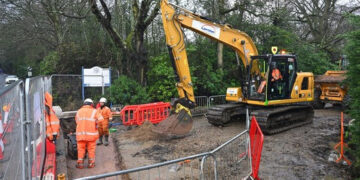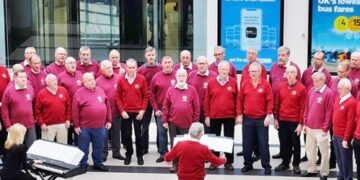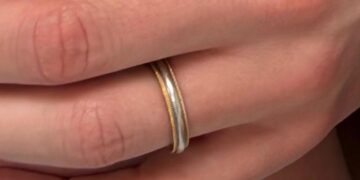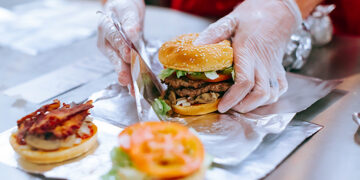Well done George Osborne on your appointment as the 31st editor of the London Evening Standard. You join a select list of editors to one of the biggest local newspapers in the country including fellow politician, the late Michael Foot.

With its woodcut Eros masthead and vendors standing outside tube stations across the capital, the Evening Standard is as much an icon of London as red phone boxes, the Tower and the Gherkin.
The paper is a rare beast: it fuses news from London with insight into the day’s big national and international stories. The nearest like it in the country is the daily Wolverhampton Express and Star – a far cry from your weekly paper, the Knutsford Guardian.
As a youngster, on the rare occasions I travelled through London, catching the different editions of the Standard was a fun sport: spotting the changes between them all the way through to the West End Final.
A skilled team of journalists, reporters, photographers, sub-editors and printers worked tirelessly throughout the day to bring the latest news, and the papers would hit the streets often with the ink still wet.

Technology has changed enormously, but the demands on the job remain the same. The internet has replaced the daily editions – and the website needs to be updated round the clock.
Like you, I edit a local newspaper. It covers a busy news patch, nowhere near as big as the seven million people who live and work in London – although with Wokingham borough being commuter belt, we share some of the same readers.
We cover political intrigues, planning issues, building concerns – all types of stories that you will have in your newslists and be sweating over as you determine the shape of that day’s book.

We even share the Prime Minister.
To you she is the leader of the country, to us she is one of the four constituency MPs who serve our borough.
We’re more likely to picture her opening a village fete or handing out prizes at a fun run than cover her pow-wowing with Donald Trump or Angela Merkel as she pushes through Brexit (interesting fact for the dinner parties: Wokingham voted to remain, despite one of its MPs, John Redwood, passionately imploring us to leave).
But there is so much more to local journalism than turning up the Standard’s offices to sign off the front page and listen to the news conference before popping into BlackRock Investment Institute to give them some advice, making a speech for the Washington Speaker’s Bureau, helping the Northern Powerhouse, researching some material for the McCain Institute or, if you’ve got the time, heading to the House of Commons to answer Mrs Jones’ letter about the cost of parking in Tatton Street car park.
You’ve got a busy diary even before you look at the Londoners’ Diary – how will you cope with the daily rigours of the local newspaper office?
I often joke that news is a demanding mistress. It puts pressures on me that go far beyond what a normal day job will ever make. It is not a nine-to-five job, let alone the nine-to-noon role you are envisioning.

Today is my day off.
That has meant squeezing in an early morning photo op with Rob Wilson, another of our four MPs, as he presented prizes at a local arts contest for children.
I then took my children to their Saturday activities and, while they were dancing or tae kwon do-ing, for the sake of another story, I popped over to a local pub where there had been an altercation.
A quick cuppa at home and then it was out to take photos of a hockey match before collecting my daughter.
While helping them with the homework, I’m also multi-tasking by looking at the readers’ letters that have come over and checking sources lest there be any breaking news.
Weekdays – my normal working day – are little better.
Our newsroom is a lot smaller than yours, so I double up as tea boy, page setter and arbitrator to readers’ queries.
That often means fielding 20-minute phone calls from someone who wants to talk to us about a story we’ve run. These calls can range from rants to tips that add new details to stories we’ve already run. At least you’re already used to being called every name under the sun.

Yesterday, for example, one reader called to let us know about how the council assist her to get the rubbish out each week as she has limited mobility. Thanks to her call, we can now help an elderly reader who wrote to us to say they were struggling with the same issue.
I’ve also had convicted drug dealers on the phone pleading us not to run their story – something different from others wanting us to cover the opening of their school fete or launch of their new album.
There is something hugely rewarding about this interaction. Yes, it’s time consuming but we know that what we write has an impact and makes a difference to the community in which we serve.
We love our scoops and we’re often busy researching as well as writing, making sure the facts fit and our sources are accurate with their tip-offs. It’s important to get this spot on.
Before we go to press, we always ask – much to Donald Trump’s chagrin – is it right, is it accurate and is it fair? No fake news for us. Our readers simply wouldn’t forgive us.
Then there are the finer details. The nitty gritty bits of journalism that are far from glamourous.
There is nothing sexy about writing NIBs (news in brief) – items that matter so much to the local community but will never set the world alight in the same way that your pasty tax did a few years ago.
The gig guide doesn’t write itself. The theatre listings and the what’s on information all come from hours of meticulous research. Laborious and thankless tasks but vital ones to ensure the community knows what’s going on around it.
Every detail in every story much be checked to avoid anything libellous, scandalous or contains a double entendre so massive that you’ll find it plastered over the internet before you can get a chance to correct it. Watch out for those JOBS BLOW headlines. Or leaking the budget ahead of the chancellor’s speech – something that the Standard did in 2013. Mistakes can be costly, not just financially but also to your reputation.

The first editors of the Daily Mirror once wrote a story about a theatrical couple who were appearing in a play. They got married in the afternoon and ‘the usual performance took place in the evening’. They meant the play. At least, we think they did…
You’ll have the schmoozing to do.
While I doubt you’ll have to spend a wet Thursday evening attending to the details of a parish council meeting, you will be invited to parties, press launches and briefings.
When they take place at lunch or evening, it’s a good bet that alcohol will be involved and, because you’re the editor, people will want to bend your ear, share their great ideas and invite themselves to write for the paper if you let them.
You will get letters from students wanting work experience or the opportunity to get a rung on the journalistic ladder.
In future, we’ll encourage them not to get their NTCJ qualification or work on their shorthand, but instead encourage them to run for Parliament and follow your career path. It might take longer, but the salary they’ll get, even as a backbencher, will dwarf the one they’ll get in regional journalism (you’ll be amazed at what I’m on George, you make more in a second than I do in a year).
Being a news junkie, you’ll find it hard to switch off. You see, our work is addictive. You don’t mind news being a mistress when she’s so seductive, so alluring, always offering you variety and something new.
That letter from your constituent about the cost of parking in Tatton Street will seem so mundane compared to the thrill of the press and getting the perfect front page off-stone in time.
You’ll be in the Commons listening to a debate about EU regulations on the correct pronunciation of scones while simultaneously be wanting to bash out a vital leader column on something more pressing.
You see George, being a newspaper editor isn’t a morning-only commitment. It isn’t a nine-to-five role either. It isn’t even a job. It’s a life.
News will be your demanding mistress. She will not let you go.
Mistreat her, and your readers will be, like they do to the wallpaper from your family’s firm, giving you a pasting.













































